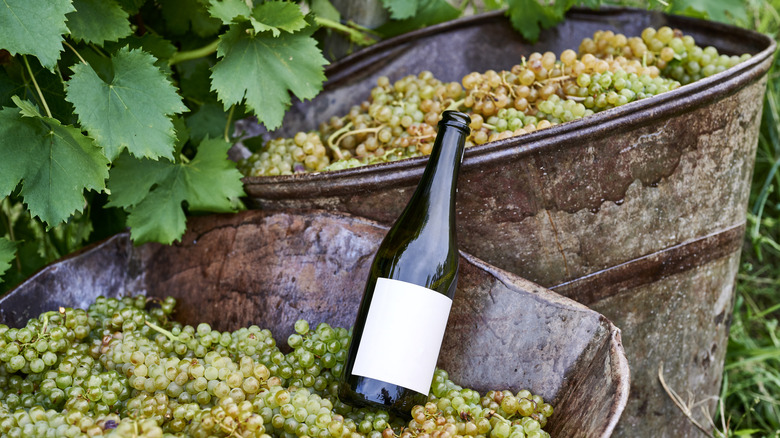What Exactly Is Natural Wine?
If you've been to a wine store or hip bar in the last decade, there's a good chance you've seen a section labeled "natural wines." This trendy process grew as an environmental-focused response to the commercialization of the wine industry as a natural partner of the locavore-organic movement. But what exactly is natural wine?
To answer this question, Food Republic sat down with May Matta-Aliah, President of In The Grape and certified wine educator, hoping she could shed some light on the subject. While similar to organic wines in the fact that the grapes grow chemical-free, the big differentiator emerges once the grapes come inside. "In the cellar, all artificial chemicals or additives are avoided and the fermentation is typically allowed to proceed spontaneously," Matta-Aliah explained. "Maturation is in neutral vessels with a general avoidance of new oak barrels." In contrast, wines can have added yeast or sugar and still be considered organic in the United States.
There is one exception to the additives rule for natural wines, which is when it comes to sulfur. According to Matta-Aliah, "The use of sulfur is either avoided altogether or is very limited to just before bottling." Winemakers use sulfur dioxide to prevent bacterial growth and oxidation, and while they've gotten something of a bad rap over the years, it's important to remember that the idea that sulfites are to blame for your wine headaches is largely a myth.
Understanding natural wines and where to find them
Some of the confusion surrounding natural wines comes from the fact that it's not actually a specific, regulated certification, unlike biodynamic wines or regional designations such as Champagne. As May Matta-Aliah noted, "natural wine remains a loosely defined category." The absence of that clear designation can make it harder to pin down what you should be looking for in a bottle. Clean wine has dealt with similar confusion, as it is similarly undefined, a confusion compounded by famous examples like Cameron Diaz's brand of clean wine falling short of some of its more lofty claims.
Some of that looseness of definition works in favor of natural winemakers, who are able to take advantage of unique local terroir to experiment with grapes that can grow in their region to great acclaim. Places like Vermont, not considered a hospitable place to grow traditional wine grapes, have seen an explosion of possibilities in this field, which means finding unique (and local) labels is easier. Matta-Aliah also explained, "Almost any fine wine store now carries natural wines."
That said, for those looking to start expanding their natural wine repertoire, Matta-Aliah suggested starting with an international choice. "I have often found Austrian wines to be a good starting point as they tend to merge very clean and precise winemaking in a natural way," Matta-Aliah stated. She also has some favorite stores to shop in, notably, Chambers Street Wines in Manhattan, New York. Just don't be put off if your first foray into natural wine isn't what you expect. Matta-Aliah informed us: "It is more common to find 'funkiness' in natural wines due to their avoidance of some tools that are commonly used in winemaking to produce clean and stable wines, such as the addition of sulfur, filtration, and fining of the wine prior to bottling."


